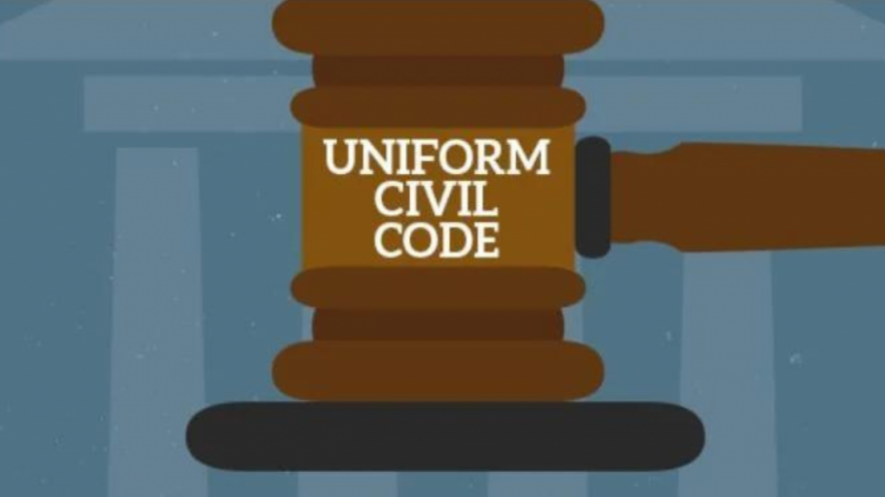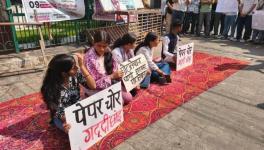Uttarakhand UCC: Safety or Subjugation?

The Uniform Civil Code (UCC) Bill was approved by the Uttarakhand Assembly on February 7, marking a stringent move as the state becomes the first in India to enforce a UCC. This code establishes a unified legal framework for marriage, divorce, and property inheritance, among other areas.
However, the legislation's most contentious aspect revolves around its regulation of personal, intimate, consensual relationships or live-in relationships, specifically between individuals of the opposite gender, which only underscores the evident heterosexual bias embedded in the state's approach to begin with.
Critics argue that beyond re-criminalising and de-legitimising queer relationships, the UCC takes a concerning stride toward the establishment of an Orwellian deep state that implies a pervasive surveillance. Where a metaphorical "big brother", the State in this case, is constantly monitoring, extending its reach even into the bedrooms of ostensibly adult and free individuals. This move is seen as a direct intrusion into the private lives of citizens.
Moreover, the UCC seems to emanate from a mindset that diminishes the autonomy and agency of women, particularly those from the minority communities. The underlying assumption appears to be that these women lack individual autonomy and, therefore, necessitate external intervention for their "safety".
Unsurprisingly, this perspective has sparked severe criticism from women's groups within the state, who argue that such legal measures perpetuate patriarchal norms and impede the genuine empowerment and autonomy of women.
Section 381 of Uttarakhand's UCC confers authority upon the Registrar to scrutinise statements submitted by prospective live-in partners. The Registrar is empowered to conduct an "enquiry" to verify whether the relationship between the couple is not deemed "prohibited." Additionally, the Registrar has the authority to summon the individuals involved. A stipulated 30-day timeframe is granted for the State authority to enter the statement in a register and issue a "registration certificate" to the couple, granting them permission to enter into a live-in relationship. It is emphasised in the code that this process is solely "for the purposes of record." A parallel procedure is activated if either or both partners wish to "terminate" the live-in relationship.
In essence, the code seeks to equate heterosexual live-in relationships to the legal status of marriage. The Code precisely defines live-in relationships as a "relationship between a man and a woman" (partners) who "cohabit in a shared household through a relationship in the nature of marriage, provided that such relations are not prohibited."
This initiative is purportedly carried out in the name of women's safety and security. However, it prompts a critical examination of the safety of women within traditional marriages if this model is to be adopted as the norm. The implicit assumption that equating live-in relationships with marriage inherently ensures women's safety, raises questions about the efficacy and actual impact of such legal measures on the lives of women.
According to a 2018 report in the Lancet magazine, the highest proportion of suicide deaths among women in India is attributed to married women. This alarming statistic is linked to various factors, such as early arranged marriages, young motherhood, low social status, domestic violence, and economic dependence.
The National Crime Records Bureau (NCRB) 2018 data further underscores the gravity of the situation, revealing nearly 20 dowry-related deaths, 35 dowry cases, and 283 cases of cruelty toward wives by husbands or their relatives reported daily in India. This distressing trend persists, as highlighted in the NCRB 2021 data, indicating that almost one-third of total crimes against women were committed by husbands or their relatives. Thus, what can be said at best about the claims of the code is that it is detached from the lived realities of women.
On the contrary, live-in relationships emerge as a potential alternative, providing couples with time and space to understand each other better. For those who choose not to marry due to various reasons, live-in arrangements offer flexibility. Importantly, these relationships afford inter-caste, inter-faith, and queer couples the autonomy to lead their private lives without the interference of family members and relatives, who often perpetrate violence.
The term 'honour killing’, refers to the murder of individuals, primarily by their own family members, to safeguard the family's 'dignity' and 'honour' when it involves inter-caste, inter-religious marriages, or relationships. While women are frequently targeted, men and boys can also be victims, including those from the queer community.
The NCRB report for 2020 attributed 25 deaths to “honour killings” but also noted 27 deaths due to casteism and 1,558 due to "illicit relationships." Similarly, in 2021, there were 33 deaths listed under "honour killings," juxtaposed with 1,544 and 1,532 deaths attributed to "illicit relationships" and "love affairs," respectively. This data underscores the complex challenges faced by individuals in traditional marriages and the potential for alternative arrangements to provide a safer space for intimate relationships.
The challenges faced by individuals seeking partnership of their own free will are widespread, extending from registrars to police and law courts. Negotiating the intricate legal-administrative procedures of registration is bound to become a harrowing experience for both men and women given the entrenched biases that operate in our society. This struggle will further be exacerbated by failure of authorities, including the police, to protect couples from violence despite their repeated pleas for assistance as we have seen till now.
The personal is undeniably political, but it is equally delicately intimate and sensitive. The choice of life partners should be rooted in individual preferences, love, and mutual understanding rather than constrained by the prevalent laws, socio-cultural redundant biases and stereotypes or external pressures.
The proposed law, instead of addressing the root cause of violence against women—the entrenched patriarchal mindset in society and institutions—poses additional hurdles and obstacles. It raises concerns about the State's intrusive role in regulating individuals' lives, especially women, minorities and queers, particularly in sensitive cases where deeply ingrained caste and religious divisions have already destabilised socio-political realities.
A critical assessment of the code reveals that it appears to be disconnected from the lived ground realities of women in particular and people in general. Rather than addressing the genuine concerns and challenges faced by women and other minorities facing everyday crimes and violence, it seems to perpetuate age-old patriarchal control over their lives and bodies. While purportedly framed in the name of women's safety, the code may, in fact, reinforce traditional norms and power structures that have long subjected women to control and restrictions, forcing them to lead unfulfilling lives.
This level of State interference in regulating individuals' lives in such an extensive manner not only poses a threat to personal freedoms which were hard for women by decades of feminist movements but also risks aggravating existing societal divisions.
Such law could possibly lead to disastrous outcomes, with the brunt of the consequences borne by those who dared to love and choose against societal norms. Thus, it is imperative to recognise and address the underlying patriarchal mindset rather than introduce legislation that might inadvertently perpetuate harmful norms and restrict individual freedoms.
The emphasis on regulating personal relationships, including live-in arrangements, without adequately addressing the root causes of violence against women, reflects a lack of understanding of the complexities involved. True empowerment of women involves challenging and dismantling patriarchal norms and institutions rather than introducing laws that might inadvertently contribute to their perpetuation.
The writer is a Doctoral Researcher at the Department of Political Science, University of Delhi. The views are personal.
Get the latest reports & analysis with people's perspective on Protests, movements & deep analytical videos, discussions of the current affairs in your Telegram app. Subscribe to NewsClick's Telegram channel & get Real-Time updates on stories, as they get published on our website.
























